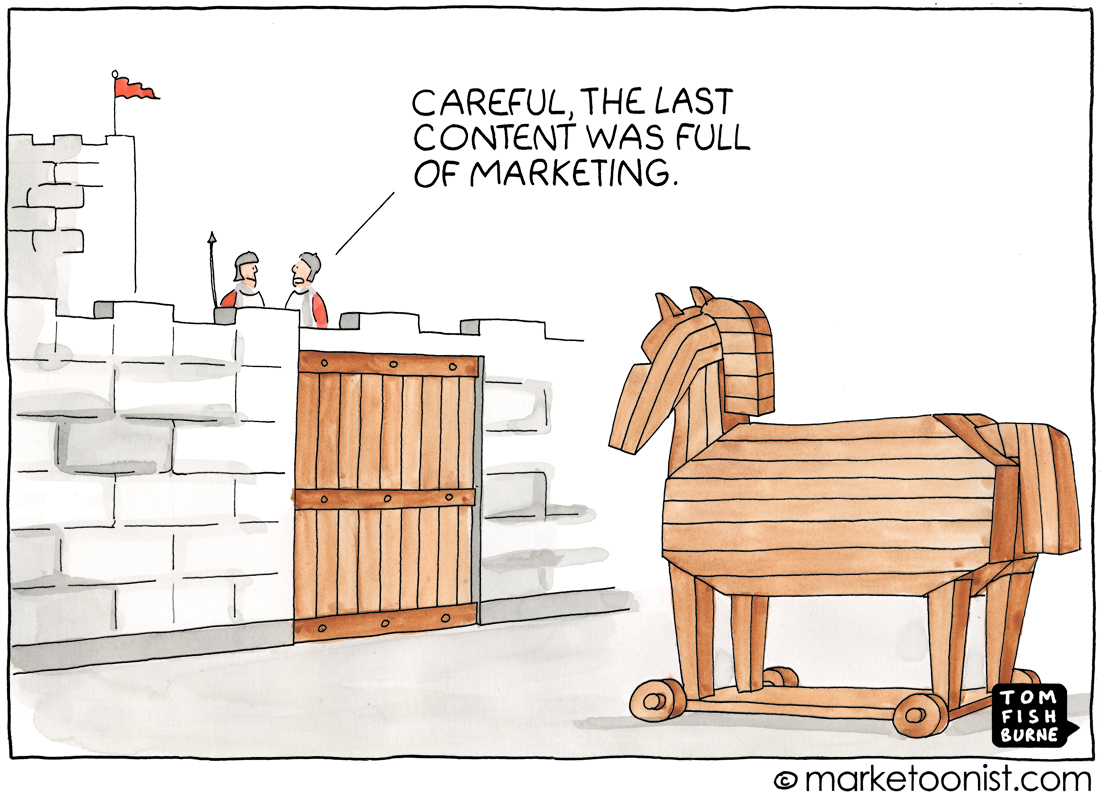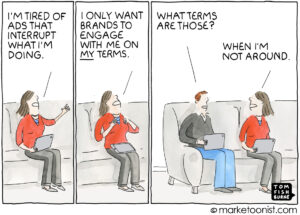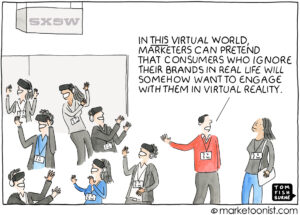The Trojan Horse metaphor is regularly used to describe content marketing. I’ve used it frequently myself. I like the idea of marketers sharing content so good that an audience would welcome it for its own sake. By sponsoring the content, the marketer’s brand comes along for the ride.
But the Trojan Horse can also be a metaphor of trickery. Historically it was a gift that, when accepted, turned into a trap.
Unfortunately, there’s a lot of content marketing that feels like a trap. No sooner have you clicked on a compelling link than you’re hit with a heavy-handed sales pitch. Or a newsletter sign-up pop-up (sometimes mandatory) that feels like being taken hostage by a sales funnel. Or the content itself is hollow.
I stumbled across an article from Karl Pearson-Cater on the dark side of thinking of content marketing as a Trojan Horse:
“So, the ‘Trojan Horse’ metaphor works great for storytelling with one important caveat: Brands need to decide if their content strategy will be used ‘for good or ill.’
“If brands choose ‘ill’, then they plan to use their content to trap their new readers, and burn everything to the ground. If brands choose ‘good’ then they plan to use their content to develop good relationships with their new readers who will actually accept the hidden (or, ‘stowed’) brand messaging because it is genuine and useful. One big problem with this is your readers have no idea if your content is ‘good or ill’ until you jump out of the Trojan Horse.”
At the end of the day, the long-term objective of any marketing program is sales. Content marketing is a balancing act of storytelling and salesmanship. But marketers sometimes forget that the content itself has to be worth it. It is by truly delivering useful content over time that content marketing works as marketing. It’s not by deceit. It’s not by scoring a bait-and-switch.
The best marketing doesn’t feel like marketing.
I’d love to hear your thoughts.



Bernie Weiss says
Good advice about eschewing deception. But content marketing is still marketing; even interesting or useful content represents the marketer’s point of view rather than objectivity. There’s nothing wrong with old fashioned ads that present a problem and show how the sponsor’s product solves it.
Phyllis Stewart says
Love this! It illustrates the problem with much of today’s marketing content….it is all about the product / solution the marketer is selling instead of solving for the problem of target customers. Marketers remember…good content is designed to educate / help prospects…not to tell them how awesome your product/solution is.
Lee Odden says
Good content marketers provide utility and experiences relevant to the brand’s solutions that satisfy an identified customer information need. I don’t see how that’s not “ill” or a trojan horse.
The whole idea of sneaking in a brand message in an overall story smacks of an unsophisticated and very tactical approach to content marketing.
Ori Pomerantz says
Being useful (or even entertaining) is hard work. It’s much simpler to pretend and send a Trojan Horse instead.
The people who buy the marketing need to do a better job of discriminating between good marketing any “annoy your customer” marketing. You can outsource some functions, such as marketing, but you cannot outsource the quality control of those functions.
Luis says
Great article! (and great cartoon!!)
If you let me do he comparison with the famous size of the logo in advertising materials, it is like if we want to make bigger the product name in the content…
From my point of view, main importance relies in how significant and relevant is our content for our consumer instead of the product name presence…
(have you seen last L’Oreal initiative? http://adage.com/article/global-news/l-oreal-unbranded-content-hub/303009/)
Max says
You won. I give you my email to get marketoon every week! 😉
Why? Cause this post about marketing doesn’t feel like marketing. And you won.
Cheers
Connie says
I recently did a contest in which 24 new independent authors were running a contest. As such, you were required to visit their website to achieve an entry on their behalf to the contest.
Of those 24, 16 had you jump right to a newsletter signup, even before you saw their books in question. 4 had “sign up for a freebie” type pages they sent you too immediately, before you knew what you were in for. Only 4 sent you to a page where they explained what they wrote, who they were, and made a pitch for why they would love to get you as a reader.
Interestingly, only one of the “signup” pages came back with an email after you had confirmed your subscription explaining what to expect, how to change your email options, and how to contact them if you had questions or content suggestions. I thought that was rather unique!
The point of this list was that there are a million places where your information is taken hostage. You stand out on the Internet these days if you actually display some class and try to work to get the customer in the right way.
Dave says
Marketing is not advertising. Marketing is finding segments and figuring out what they want. Advertising is getting people to sign up for this or that or showing them brand images and products.